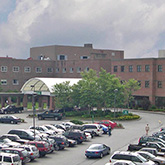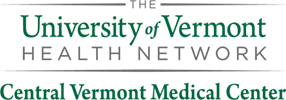Learn about cardiomyopathy and treatment options at Central Vermont Medical Center.
Request an Appointment
Request an appointment with a UVM Health Network – Central Vermont Medical Center cardiologist.
What is Cardiomyopathy?
Cardiomyopathy occurs when the heart muscle weakens and enlarges. This condition makes it difficult for the heart to efficiently pump blood and circulate it throughout the body. When left untreated, cardiomyopathy can lead to heart failure. There are three common types of the condition:
- Dilated cardiomyopathy
- Hypertrophic cardiomyopathy
- Restrictive cardiomyopathy
Dilated Cardiomyopathy
The most common type of cardiomyopathy is dilated cardiomyopathy. It often occurs as a result of a heart attack damaging the heart muscle. The weakened heart muscle begins to stretch (dilate), reducing the heart’s ability to pump blood properly. It can then lead to heart failure. Dilated cardiomyopathy can affect people at any age, but most commonly it occurs in middle-aged people and more often in men. This heart condition can be genetic as well.
Hypertrophic Cardiomyopathy
The most common genetic heart disease is hypertrophic cardiomyopathy. It occurs when the heart muscle thickens, causing the heart to stiffen. As the heart grows in size, the chambers become smaller. This makes it difficult for it to receive enough blood and oxygen, resulting in chest pain. Although this type of cardiomyopathy can occur at any age, it is often more severe the earlier in life the symptoms arise.
Restrictive Cardiomyopathy
The least common type of cardiomyopathy is restrictive cardiomyopathy. This condition occurs when the heart muscle stiffens, preventing the heart from being able to stretch enough to allow blood to enter and flow into the lower ventricles. As a result, blood that is supposed to enter the heart becomes backed up in the circulatory system causing heart failure. Restrictive cardiomyopathy most commonly occurs in elderly people, but it can also happen at any age. Diseases that affect the heart are likely causes of the condition.
Cardiomyopathy: What You Need to Know
Although cardiomyopathy is not preventable in most cases, when the proper lifestyle changes are applied, the risk of heart failure can be greatly reduced. Doctors typically recommend the following:
- Eliminate the intake of alcohol
- Alter your diet and eating habits to include more fruits, vegetables and lean proteins
- Exercise on a regular basis
- Regulate high blood pressure
During the early stages of cardiomyopathy, symptoms are harder to detect. It’s during the more advanced stages that symptoms will begin to appear. Whether you have hypertrophic, dilated or restrictive cardiomyopathy, symptoms will worsen quickly if you don’t seek proper treatment. Common cardiomyopathy symptoms may include:
- Shortness of breath with physical activity or even at rest
- Swelling of the legs, ankles and feet
- Abdominal bloating due to fluid buildup
- Fatigue
- Irregular heartbeats that feel fast, pounding or fluttering
- Dizziness
- Passing out (fainting)
Although the exact causes are unknown, there are known factors that increase the risk and lead to the development of cardiomyopathy. These include:
- High blood pressure
- Heart valve problems
- Heart tissue damage from a heart attack
- Persistent rapid heart rate
- Metabolic disorders, such as hyperthyroidism, hypothyroidism or diabetes
- Not eating enough essential vitamins or minerals, such as: Thiamin (vitamin B-1), Selenium, Calcium, and Magnesium.
- Pregnancy
- Alcohol addiction
- Drug addiction
- Chemotherapy drugs used to treat cancer
- Viral infections than can damage your heart
- Hemochromatosis: an iron buildup in your heart muscle
- Genetic conditions
Diagnosis and Treatment: Cardiomyopathy
With an advanced level of knowledge now available to doctors, there is a broad range of diagnostic exams and effective treatments for cardiomyopathy patients. You’ll be able to work with a team of experienced cardiologists who can suggest the treatment plan that is best suited to your needs.
The following procedures and treatments can be used to prevent cardiomyopathy from worsening, reduce symptoms and minimize the risk of complications:
- Surgically implanted devices: Pacemakers, ICDs, and VADs**
- Cardiac catheterization: Alcohol Septal Ablation*
- Surgery: heart transplant** or a septal myectomy*
- Medications to manage causes of cardiomyopathy
*Indicates treatments available only at Network level.
**VADS and heart transplants are only available outside the Network (e.g. Boston)
Personalized Care from an Experienced Team
The UVM Health Network physicians are highly trained in performing procedures to diagnose and treat cardiomyopathy such as echocardiogram and pacemaker implantation.
To make an appointment with one of our specialists, please call 802-225-5660

CVMC Cardiology
Phone
Fax
802-229-9533
Hours
Monday:Phone Hours:
8:30 pm - 12:00 pm
1:00 pm - 5:00 pm

